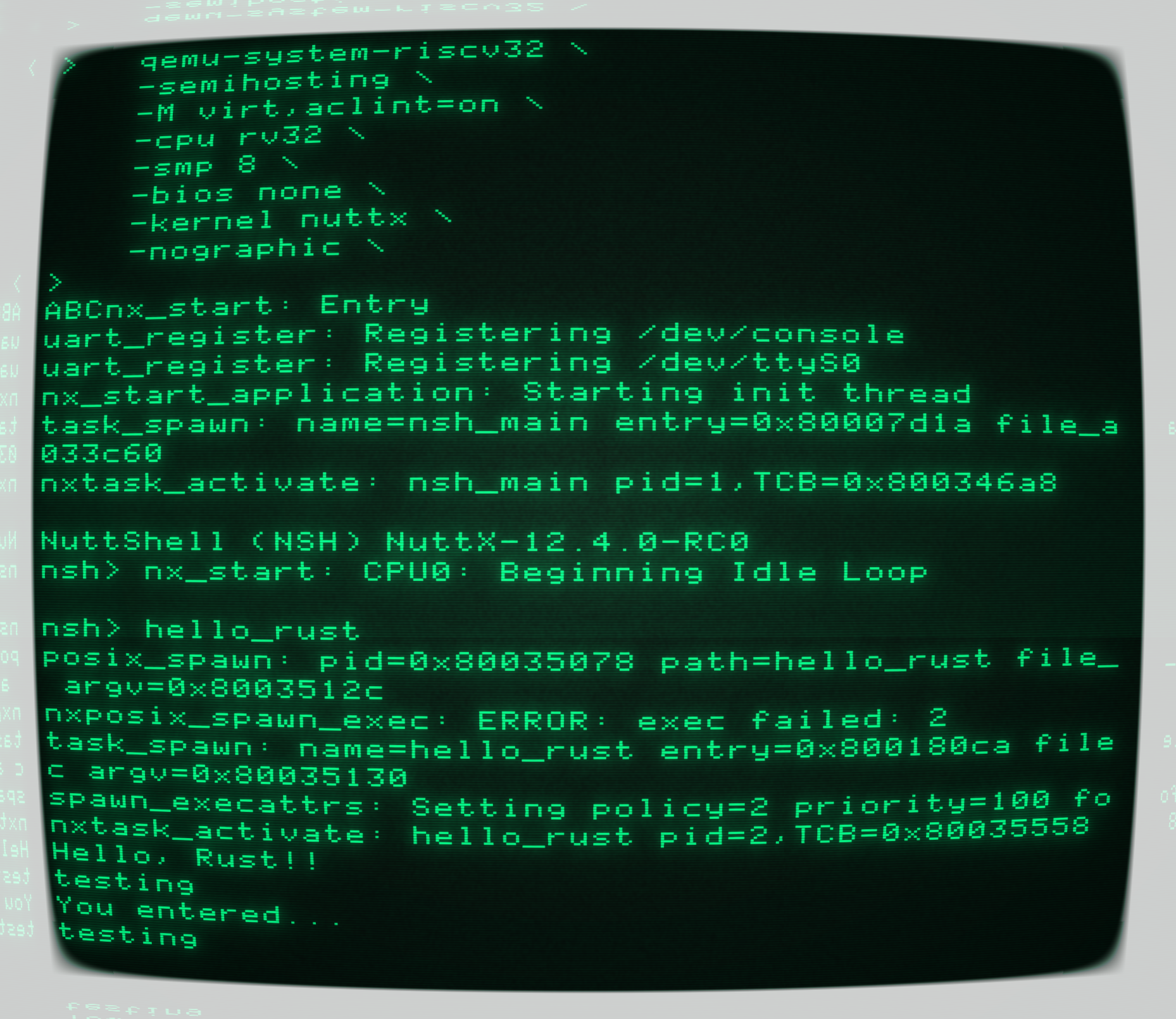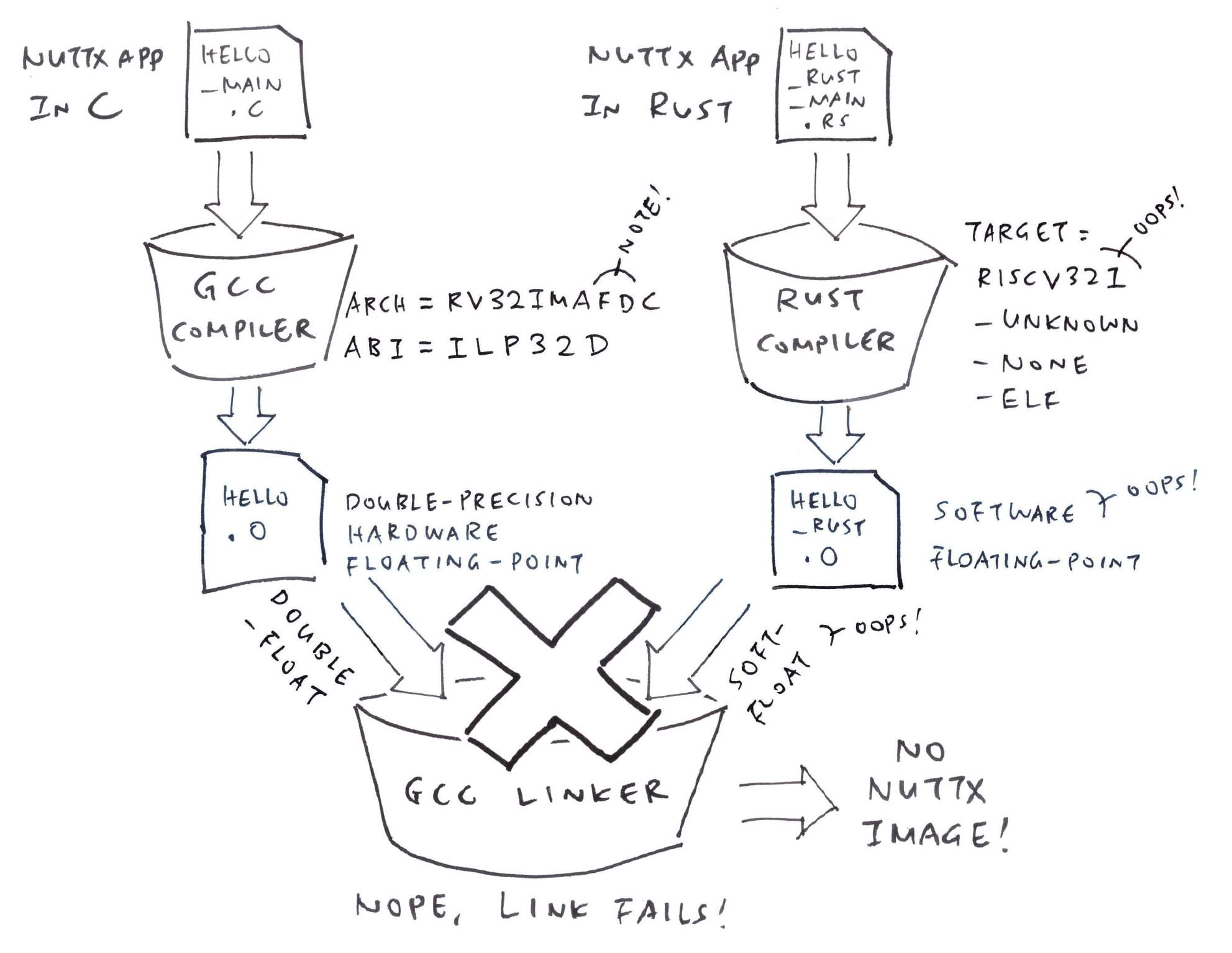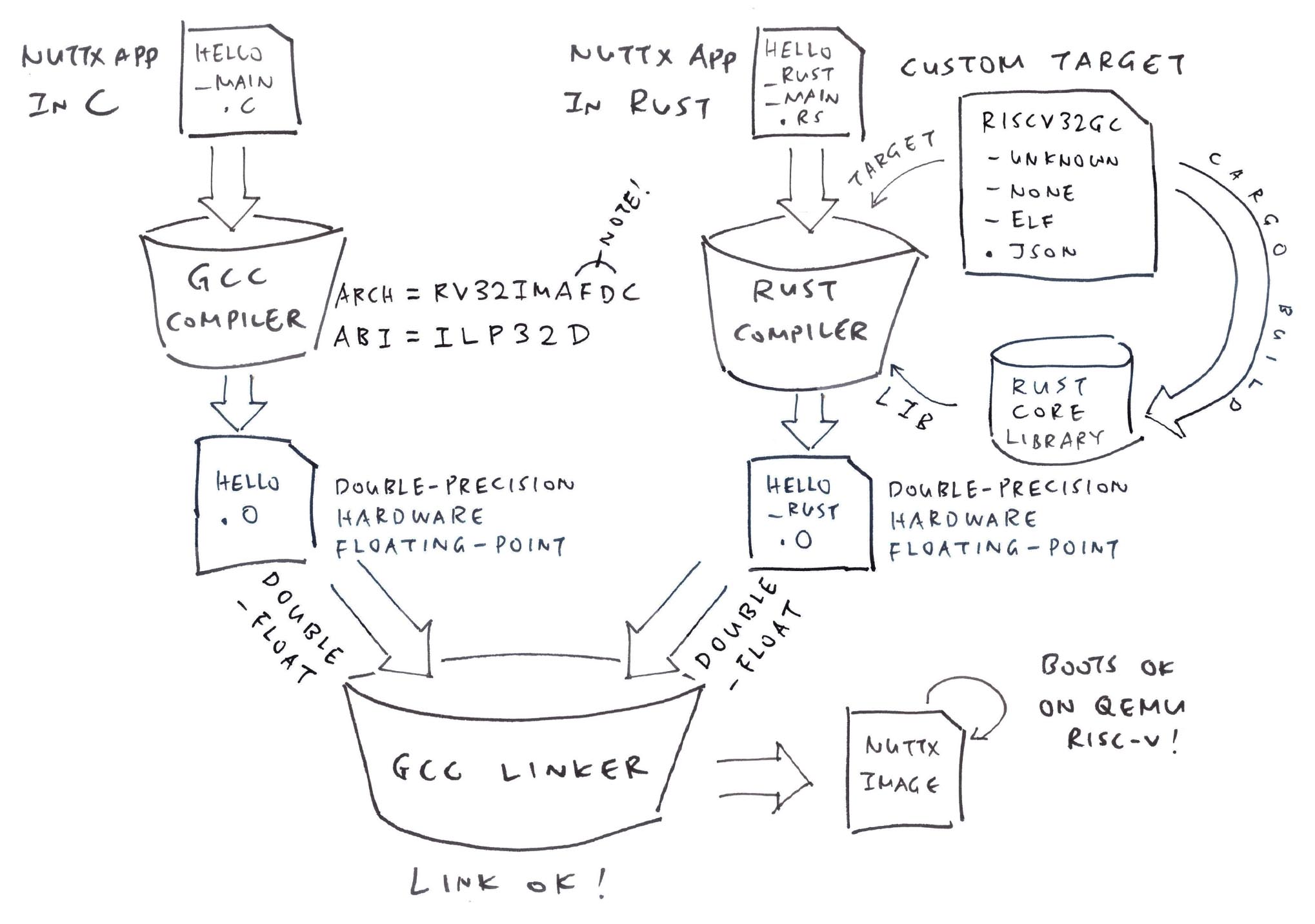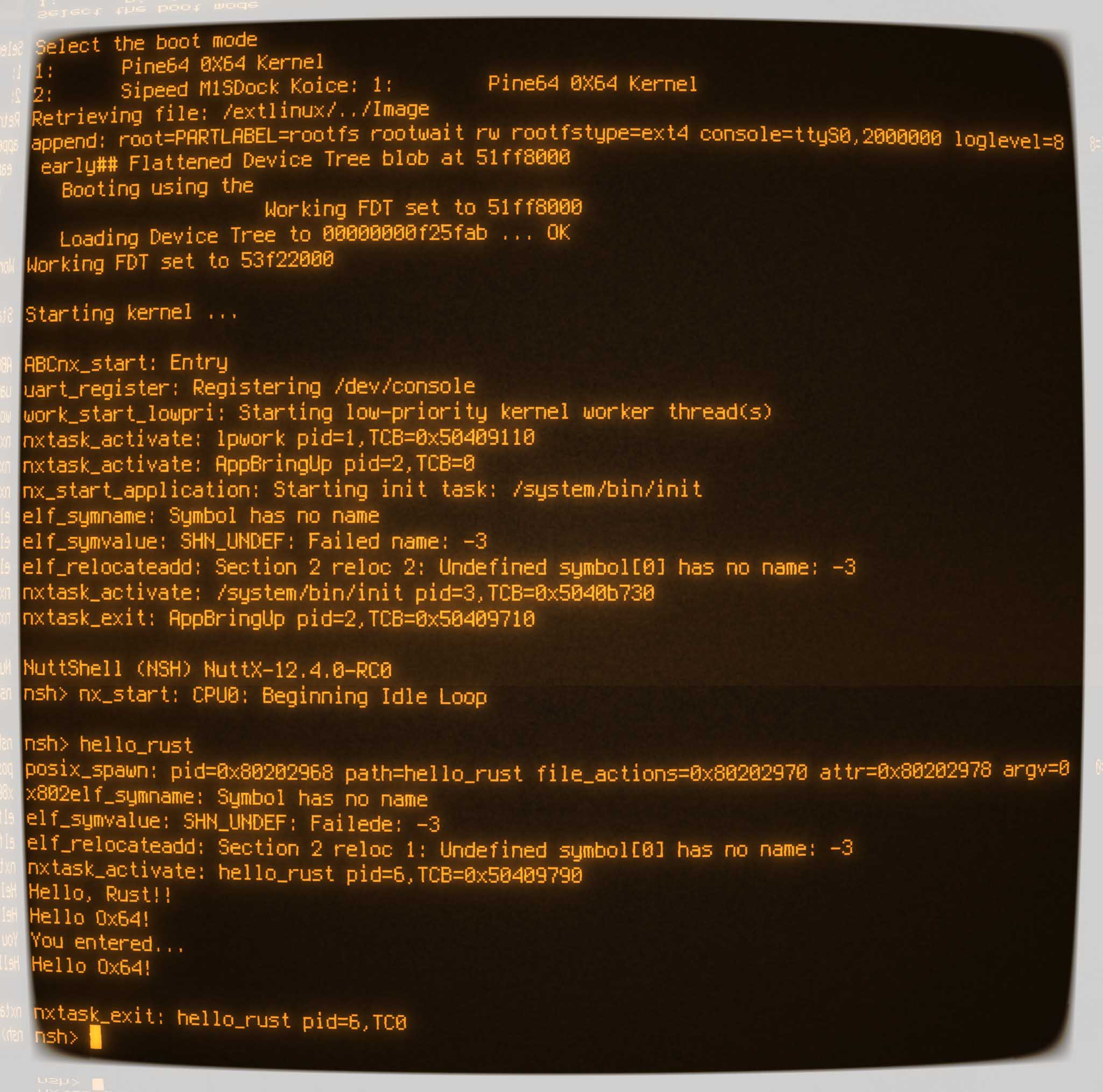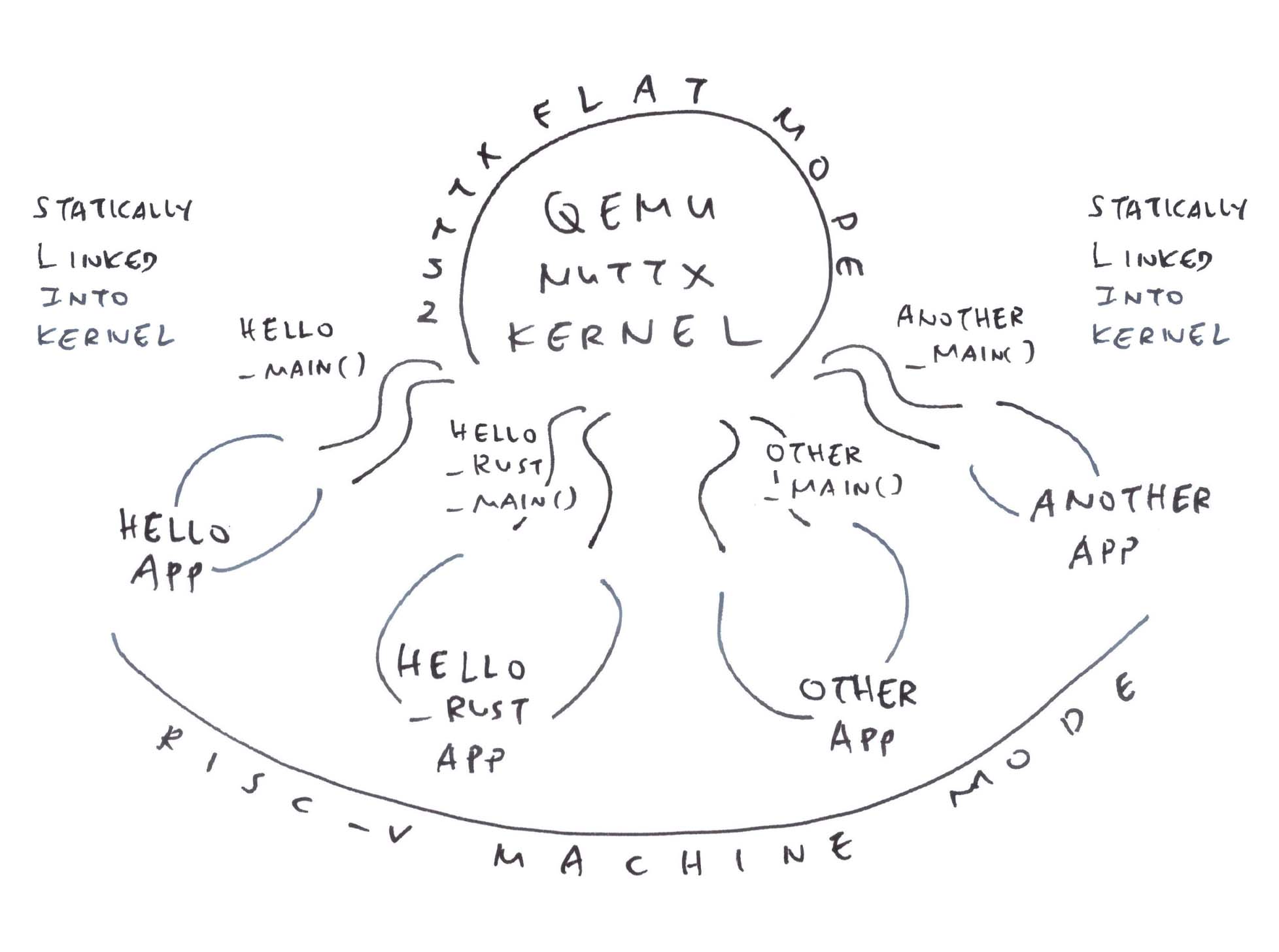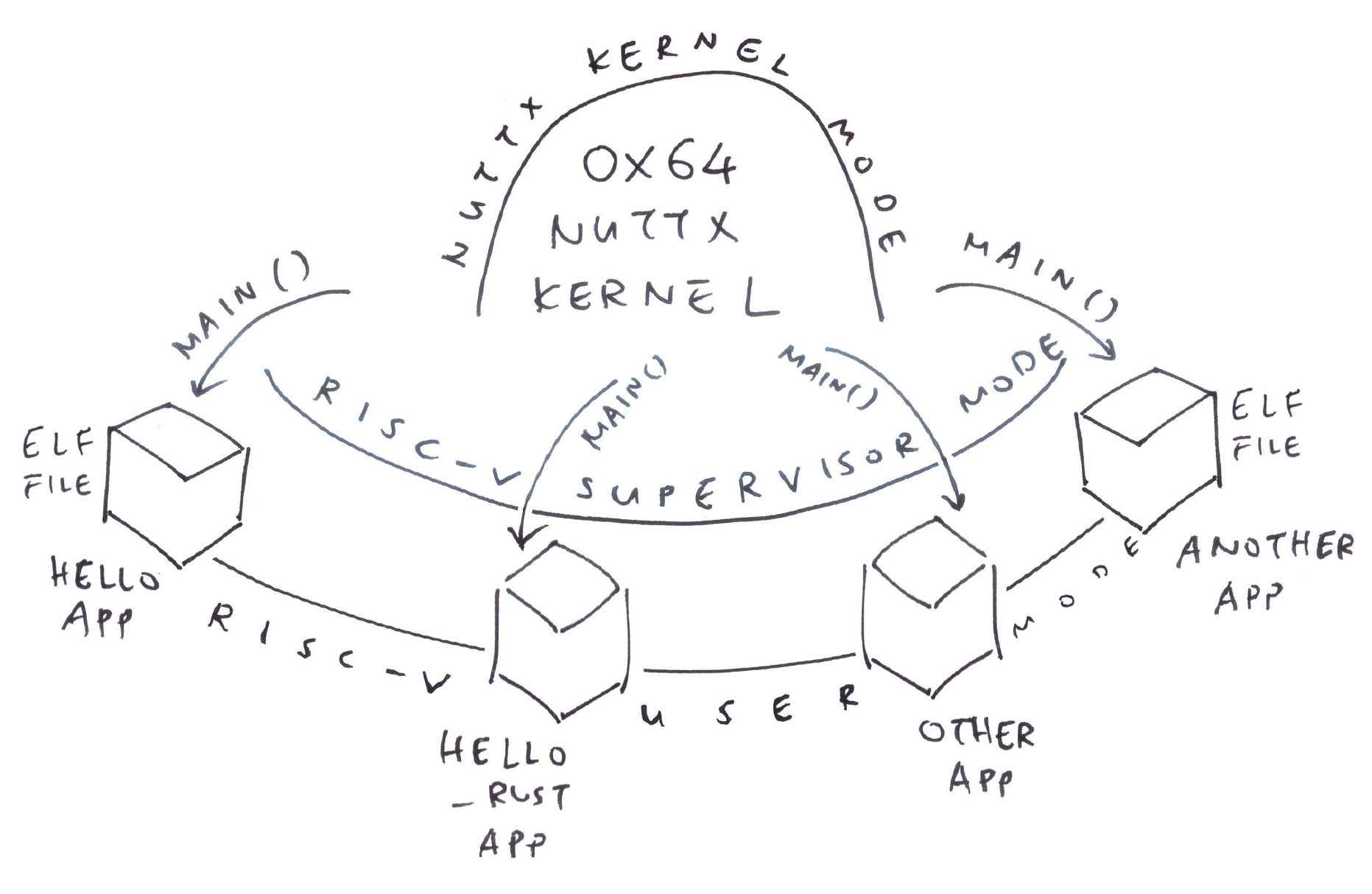Read the articles...
Read on to find out how everything all started...
Read the article...
We have a problem compiling Rust Apps for QEMU RISC-V 32-bit...
$ make
LD: nuttx
riscv64-unknown-elf-ld: nuttx/nuttx/staging/libapps.a
(hello_rust_main.rs...nuttx.apps.examples.hello_rust_1.o):
can't link soft-float modules with double-float modules
riscv64-unknown-elf-ld: failed to merge target specific data of file
nuttx/staging/libapps.a
(hello_rust_main.rs...nuttx.apps.examples.hello_rust_1.o)That's because NuttX builds Rust Apps for riscv32i-unknown-none-elf (Software Floating-Point)...
## Compile `hello_rust_main.rs` to `hello_rust.o`
## for Rust Target: RISC-V 32-bit (Soft-Float)
rustc \
--edition 2021 \
--emit obj \
-g \
--target riscv32i-unknown-none-elf \
-C panic=abort \
-O \
hello_rust_main.rs \
-o hello_rust_main.rs...apps.examples.hello_rust.oBut the rest of NuttX is Double-Precision Hardware Floating-Point!
(-march=rv32imafdc -mabi=ilp32d)
$ make --trace
...
riscv64-unknown-elf-gcc \
-c \
-fno-common \
-Wall \
-Wstrict-prototypes \
-Wshadow \
-Wundef \
-Wno-attributes \
-Wno-unknown-pragmas \
-Wno-psabi \
-Os \
-fno-strict-aliasing \
-fomit-frame-pointer \
-ffunction-sections \
-fdata-sections \
-g \
-march=rv32imafdc \
-mabi=ilp32d \
-isystem nuttx/include \
-D__NuttX__ \
-DNDEBUG \
-pipe \
-I "apps/include" \
-Dmain=hello_main \
hello_main.c \
-o hello_main.c...apps.examples.hello.o \Does Rust support Double-Precision Hardware Floating-Point?
We're looking for a Rust Target like riscv32gc-unknown-none-elf...
$ rustup target list | grep riscv
riscv32i-unknown-none-elf
riscv32imac-unknown-none-elf
riscv32imc-unknown-none-elf
riscv64gc-unknown-linux-gnu
riscv64gc-unknown-none-elf
riscv64imac-unknown-none-elfBut nope it's not supported! So we create a Rust Custom Target for riscv32gc-unknown-none-elf...
Let's dump the Rust Targets riscv32i and riscv64gc to compare...
$ rustc \
+nightly \
-Z unstable-options \
--print target-spec-json \
--target riscv32i-unknown-none-elf
{
"arch": "riscv32",
"atomic-cas": false,
"cpu": "generic-rv32",
"data-layout": "e-m:e-p:32:32-i64:64-n32-S128",
"eh-frame-header": false,
"emit-debug-gdb-scripts": false,
"is-builtin": true,
"linker": "rust-lld",
"linker-flavor": "ld.lld",
"llvm-target": "riscv32",
"max-atomic-width": 0,
"panic-strategy": "abort",
"relocation-model": "static",
"target-pointer-width": "32"
}
$ rustc \
+nightly \
-Z unstable-options \
--print target-spec-json \
--target riscv64gc-unknown-none-elf
{
"arch": "riscv64",
"code-model": "medium",
"cpu": "generic-rv64",
"data-layout": "e-m:e-p:64:64-i64:64-i128:128-n32:64-S128",
"eh-frame-header": false,
"emit-debug-gdb-scripts": false,
"features": "+m,+a,+f,+d,+c",
"is-builtin": true,
"linker": "rust-lld",
"linker-flavor": "ld.lld",
"llvm-abiname": "lp64d",
"llvm-target": "riscv64",
"max-atomic-width": 64,
"panic-strategy": "abort",
"relocation-model": "static",
"supported-sanitizers": [
"kernel-address"
],
"target-pointer-width": "64"
}Based on the above, we create our Rust Custom Target: riscv32gc-unknown-none-elf.json
{
"arch": "riscv32",
"cpu": "generic-rv32",
"data-layout": "e-m:e-p:32:32-i64:64-n32-S128",
"eh-frame-header": false,
"emit-debug-gdb-scripts": false,
"features": "+m,+a,+f,+d,+c",
"linker": "rust-lld",
"linker-flavor": "ld.lld",
"llvm-abiname": "ilp32d",
"llvm-target": "riscv32",
"max-atomic-width": 0,
"panic-strategy": "abort",
"relocation-model": "static",
"target-pointer-width": "32"
}Which is based on riscv32i with these changes...
-
Removed
"atomic-cas": false -
Added
"features": "+m,+a,+f,+d,+c" -
Removed
"is-builtin": true -
Added
"llvm-abiname": "ilp32d"(
ilp32dcomes frommake --traceabove)
Now we build the Rust Core Library for riscv32gc...
## Verify our Custom Target
rustc \
--print cfg \
--target riscv32gc-unknown-none-elf.json
## Build the Rust Core Library for `riscv32gc`
## Ignore the error: `app already exists`
cargo new app
pushd app
cargo clean
## Ignore the error: `can't find crate for std`
cargo build \
-Zbuild-std=core,alloc \
--target ../riscv32gc-unknown-none-elf.json
popdWe rebuild our Rust App with the new Rust Custom Target (linked to our Rust Core Library)...
## Compile our Rust App.
## Changed the target to riscv32gc-unknown-none-elf.json
rustc \
--edition 2021 \
--emit obj \
-g \
--target riscv32gc-unknown-none-elf.json \
-C panic=abort \
-O \
../apps/examples/hello_rust/hello_rust_main.rs \
-o ../apps/examples/hello_rust/*hello_rust.o \
\
-C incremental=app/target/riscv32gc-unknown-none-elf/debug/incremental \
-L dependency=app/target/riscv32gc-unknown-none-elf/debug/deps \
-L dependency=app/target/debug/deps \
--extern noprelude:alloc=`ls app/target/riscv32gc-unknown-none-elf/debug/deps/liballoc-*.rlib` \
--extern noprelude:compiler_builtins=`ls app/target/riscv32gc-unknown-none-elf/debug/deps/libcompiler_builtins-*.rlib` \
--extern noprelude:core=`ls app/target/riscv32gc-unknown-none-elf/debug/deps/libcore-*.rlib` \
-Z unstable-options
## Dump the ELF Header. Should show:
## Flags: 0x5, RVC, double-float ABI
riscv64-unknown-elf-readelf \
-h -A \
../apps/examples/hello_rust/*hello_rust.o
## NuttX should link and execute correctly now
cp \
../apps/examples/hello_rust/*hello_rust.o \
../apps/examples/hello_rust/*hello_rust_1.o
pushd ../nuttx
make
qemu-system-riscv32 \
-semihosting \
-M virt,aclint=on \
-cpu rv32 \
-smp 8 \
-bios none \
-kernel nuttx \
-nographic
popdAnd it works!
Our Rust App links OK! Has the ELF Header changed?
Yep the ELF Header has changed from Soft-Float to Double-Float...
## Before Custom Target
$ riscv64-unknown-elf-readelf \
-h -A \
../apps/examples/hello_rust/*hello_rust_1.o
ELF Header:
Magic: 7f 45 4c 46 01 01 01 00 00 00 00 00 00 00 00 00
Class: ELF32
Data: 2's complement, little endian
Version: 1 (current)
OS/ABI: UNIX - System V
ABI Version: 0
Type: REL (Relocatable file)
Machine: RISC-V
Version: 0x1
Entry point address: 0x0
Start of program headers: 0 (bytes into file)
Start of section headers: 10240 (bytes into file)
Flags: 0x0
Size of this header: 52 (bytes)
Size of program headers: 0 (bytes)
Number of program headers: 0
Size of section headers: 40 (bytes)
Number of section headers: 29
Section header string table index: 1
Attribute Section: riscv
File Attributes
Tag_RISCV_stack_align: 16-bytes
Tag_RISCV_arch: "rv32i2p1"
## After Custom Target
$ riscv64-unknown-elf-readelf \
-h -A \
../apps/examples/hello_rust/*hello_rust.o
ELF Header:
Magic: 7f 45 4c 46 01 01 01 00 00 00 00 00 00 00 00 00
Class: ELF32
Data: 2's complement, little endian
Version: 1 (current)
OS/ABI: UNIX - System V
ABI Version: 0
Type: REL (Relocatable file)
Machine: RISC-V
Version: 0x1
Entry point address: 0x0
Start of program headers: 0 (bytes into file)
Start of section headers: 10352 (bytes into file)
Flags: 0x5, RVC, double-float ABI
Size of this header: 52 (bytes)
Size of program headers: 0 (bytes)
Number of program headers: 0
Size of section headers: 40 (bytes)
Number of section headers: 29
Section header string table index: 1
Attribute Section: riscv
File Attributes
Tag_RISCV_stack_align: 16-bytes
Tag_RISCV_arch: "rv32i2p1_m2p0_a2p1_f2p2_d2p2_c2p0_zicsr2p0"
## Which looks similar to other C Binaries
$ riscv64-unknown-elf-readelf \
-h -A \
../apps/examples/hello/*hello.o
ELF Header:
Magic: 7f 45 4c 46 01 01 01 00 00 00 00 00 00 00 00 00
Class: ELF32
Data: 2's complement, little endian
Version: 1 (current)
OS/ABI: UNIX - System V
ABI Version: 0
Type: REL (Relocatable file)
Machine: RISC-V
Version: 0x1
Entry point address: 0x0
Start of program headers: 0 (bytes into file)
Start of section headers: 3776 (bytes into file)
Flags: 0x5, RVC, double-float ABI
Size of this header: 52 (bytes)
Size of program headers: 0 (bytes)
Number of program headers: 0
Size of section headers: 40 (bytes)
Number of section headers: 26
Section header string table index: 25
Attribute Section: riscv
File Attributes
Tag_RISCV_stack_align: 16-bytes
Tag_RISCV_arch: "rv32i2p0_m2p0_a2p0_f2p0_d2p0_c2p0"How did we figure out the rustc options?
cargo build will call rustc with a whole bunch of options.
We ran cargo build -v to dump the rustc options that were used to compile a Rust App with our Custom Rust Core Library for riscv32gc...
$ cargo build -v \
-Zbuild-std=core,alloc \
--target ../riscv32gc-unknown-none-elf.json
Compiling compiler_builtins v0.1.101
Compiling core v0.0.0 ($HOME/.rustup/toolchains/nightly-x86_64-apple-darwin/lib/rustlib/src/rust/library/core)
Running `$HOME/.rustup/toolchains/nightly-x86_64-apple-darwin/bin/rustc --crate-name build_script_build --edition=2018 $HOME/.cargo/registry/src/index.crates.io-6f17d22bba15001f/compiler_builtins-0.1.101/build.rs --error-format=json --json=diagnostic-rendered-ansi,artifacts,future-incompat --diagnostic-width=94 --crate-type bin --emit=dep-info,link -C embed-bitcode=no -C debuginfo=2 -C split-debuginfo=unpacked --cfg 'feature="compiler-builtins"' --cfg 'feature="core"' --cfg 'feature="default"' --cfg 'feature="rustc-dep-of-std"' -C metadata=9bd0bac7535b33a8 -C extra-filename=-9bd0bac7535b33a8 --out-dir $HOME/riscv/nuttx-rust-app/app/target/debug/build/compiler_builtins-9bd0bac7535b33a8 -Z force-unstable-if-unmarked -L dependency=$HOME/riscv/nuttx-rust-app/app/target/debug/deps --cap-lints allow`
Running `$HOME/.rustup/toolchains/nightly-x86_64-apple-darwin/bin/rustc --crate-name core --edition=2021 $HOME/.rustup/toolchains/nightly-x86_64-apple-darwin/lib/rustlib/src/rust/library/core/src/lib.rs --error-format=json --json=diagnostic-rendered-ansi,artifacts,future-incompat --diagnostic-width=94 --crate-type lib --emit=dep-info,metadata,link -C embed-bitcode=no -C debuginfo=2 -C metadata=d271c6ebb87f9b41 -C extra-filename=-d271c6ebb87f9b41 --out-dir $HOME/riscv/nuttx-rust-app/app/target/riscv32gc-unknown-none-elf/debug/deps --target $HOME/riscv/nuttx-rust-app/riscv32gc-unknown-none-elf.json -Z force-unstable-if-unmarked -L dependency=$HOME/riscv/nuttx-rust-app/app/target/riscv32gc-unknown-none-elf/debug/deps -L dependency=$HOME/riscv/nuttx-rust-app/app/target/debug/deps --cap-lints allow`
Running `$HOME/riscv/nuttx-rust-app/app/target/debug/build/compiler_builtins-9bd0bac7535b33a8/build-script-build`
Compiling rustc-std-workspace-core v1.99.0 ($HOME/.rustup/toolchains/nightly-x86_64-apple-darwin/lib/rustlib/src/rust/library/rustc-std-workspace-core)
Running `$HOME/.rustup/toolchains/nightly-x86_64-apple-darwin/bin/rustc --crate-name rustc_std_workspace_core --edition=2021 $HOME/.rustup/toolchains/nightly-x86_64-apple-darwin/lib/rustlib/src/rust/library/rustc-std-workspace-core/lib.rs --error-format=json --json=diagnostic-rendered-ansi,artifacts,future-incompat --diagnostic-width=94 --crate-type lib --emit=dep-info,metadata,link -C embed-bitcode=no -C debuginfo=2 -C metadata=52e0df2b2cc19b6e -C extra-filename=-52e0df2b2cc19b6e --out-dir $HOME/riscv/nuttx-rust-app/app/target/riscv32gc-unknown-none-elf/debug/deps --target $HOME/riscv/nuttx-rust-app/riscv32gc-unknown-none-elf.json -Z force-unstable-if-unmarked -L dependency=$HOME/riscv/nuttx-rust-app/app/target/riscv32gc-unknown-none-elf/debug/deps -L dependency=$HOME/riscv/nuttx-rust-app/app/target/debug/deps --extern core=$HOME/riscv/nuttx-rust-app/app/target/riscv32gc-unknown-none-elf/debug/deps/libcore-d271c6ebb87f9b41.rmeta --cap-lints allow`
Running `$HOME/.rustup/toolchains/nightly-x86_64-apple-darwin/bin/rustc --crate-name compiler_builtins --edition=2018 $HOME/.cargo/registry/src/index.crates.io-6f17d22bba15001f/compiler_builtins-0.1.101/src/lib.rs --error-format=json --json=diagnostic-rendered-ansi,artifacts,future-incompat --diagnostic-width=94 --crate-type lib --emit=dep-info,metadata,link -C embed-bitcode=no -C debuginfo=2 --cfg 'feature="compiler-builtins"' --cfg 'feature="core"' --cfg 'feature="default"' --cfg 'feature="rustc-dep-of-std"' -C metadata=cd0d33c2bd30ca51 -C extra-filename=-cd0d33c2bd30ca51 --out-dir $HOME/riscv/nuttx-rust-app/app/target/riscv32gc-unknown-none-elf/debug/deps --target $HOME/riscv/nuttx-rust-app/riscv32gc-unknown-none-elf.json -Z force-unstable-if-unmarked -L dependency=$HOME/riscv/nuttx-rust-app/app/target/riscv32gc-unknown-none-elf/debug/deps -L dependency=$HOME/riscv/nuttx-rust-app/app/target/debug/deps --extern core=$HOME/riscv/nuttx-rust-app/app/target/riscv32gc-unknown-none-elf/debug/deps/librustc_std_workspace_core-52e0df2b2cc19b6e.rmeta --cap-lints allow --cfg 'feature="unstable"' --cfg 'feature="mem"'`
Compiling alloc v0.0.0 ($HOME/.rustup/toolchains/nightly-x86_64-apple-darwin/lib/rustlib/src/rust/library/alloc)
Running `$HOME/.rustup/toolchains/nightly-x86_64-apple-darwin/bin/rustc --crate-name alloc --edition=2021 $HOME/.rustup/toolchains/nightly-x86_64-apple-darwin/lib/rustlib/src/rust/library/alloc/src/lib.rs --error-format=json --json=diagnostic-rendered-ansi,artifacts,future-incompat --diagnostic-width=94 --crate-type lib --emit=dep-info,metadata,link -C embed-bitcode=no -C debuginfo=2 -C metadata=5d7bc2e4f3c29e08 -C extra-filename=-5d7bc2e4f3c29e08 --out-dir $HOME/riscv/nuttx-rust-app/app/target/riscv32gc-unknown-none-elf/debug/deps --target $HOME/riscv/nuttx-rust-app/riscv32gc-unknown-none-elf.json -Z force-unstable-if-unmarked -L dependency=$HOME/riscv/nuttx-rust-app/app/target/riscv32gc-unknown-none-elf/debug/deps -L dependency=$HOME/riscv/nuttx-rust-app/app/target/debug/deps --extern compiler_builtins=$HOME/riscv/nuttx-rust-app/app/target/riscv32gc-unknown-none-elf/debug/deps/libcompiler_builtins-cd0d33c2bd30ca51.rmeta --extern core=$HOME/riscv/nuttx-rust-app/app/target/riscv32gc-unknown-none-elf/debug/deps/libcore-d271c6ebb87f9b41.rmeta --cap-lints allow`
Compiling app v0.1.0 ($HOME/riscv/nuttx-rust-app/app)
Running `$HOME/.rustup/toolchains/nightly-x86_64-apple-darwin/bin/rustc --crate-name app --edition=2021 src/main.rs --error-format=json --json=diagnostic-rendered-ansi,artifacts,future-incompat --diagnostic-width=94 --crate-type bin --emit=dep-info,link -C embed-bitcode=no -C debuginfo=2 -C metadata=1ff442e6481e1397 -C extra-filename=-1ff442e6481e1397 --out-dir $HOME/riscv/nuttx-rust-app/app/target/riscv32gc-unknown-none-elf/debug/deps --target $HOME/riscv/nuttx-rust-app/riscv32gc-unknown-none-elf.json -C incremental=$HOME/riscv/nuttx-rust-app/app/target/riscv32gc-unknown-none-elf/debug/incremental -L dependency=$HOME/riscv/nuttx-rust-app/app/target/riscv32gc-unknown-none-elf/debug/deps -L dependency=$HOME/riscv/nuttx-rust-app/app/target/debug/deps --extern 'noprelude:alloc=$HOME/riscv/nuttx-rust-app/app/target/riscv32gc-unknown-none-elf/debug/deps/liballoc-5d7bc2e4f3c29e08.rlib' --extern 'noprelude:compiler_builtins=$HOME/riscv/nuttx-rust-app/app/target/riscv32gc-unknown-none-elf/debug/deps/libcompiler_builtins-cd0d33c2bd30ca51.rlib' --extern 'noprelude:core=$HOME/riscv/nuttx-rust-app/app/target/riscv32gc-unknown-none-elf/debug/deps/libcore-d271c6ebb87f9b41.rlib' -Z unstable-options`
error[E0463]: can't find crate for `std`
|
= note: the `riscv32gc-unknown-none-elf` target may not support the standard library
= note: `std` is required by `app` because it does not declare `#![no_std]`
= help: consider building the standard library from source with `cargo build -Zbuild-std`
error: cannot find macro `println` in this scope
--> src/main.rs:2:5
|
2 | println!("Hello, world!");
| ^^^^^^^
error: `#[panic_handler]` function required, but not found
For more information about this error, try `rustc --explain E0463`.
error: could not compile `app` (bin "app") due to 3 previous errors
Caused by:
process didn't exit successfully: `$HOME/.rustup/toolchains/nightly-x86_64-apple-darwin/bin/rustc --crate-name app --edition=2021 src/main.rs --error-format=json --json=diagnostic-rendered-ansi,artifacts,future-incompat --diagnostic-width=94 --crate-type bin --emit=dep-info,link -C embed-bitcode=no -C debuginfo=2 -C metadata=1ff442e6481e1397 -C extra-filename=-1ff442e6481e1397 --out-dir $HOME/riscv/nuttx-rust-app/app/target/riscv32gc-unknown-none-elf/debug/deps --target $HOME/riscv/nuttx-rust-app/riscv32gc-unknown-none-elf.json -C incremental=$HOME/riscv/nuttx-rust-app/app/target/riscv32gc-unknown-none-elf/debug/incremental -L dependency=$HOME/riscv/nuttx-rust-app/app/target/riscv32gc-unknown-none-elf/debug/deps -L dependency=$HOME/riscv/nuttx-rust-app/app/target/debug/deps --extern 'noprelude:alloc=$HOME/riscv/nuttx-rust-app/app/target/riscv32gc-unknown-none-elf/debug/deps/liballoc-5d7bc2e4f3c29e08.rlib' --extern 'noprelude:compiler_builtins=$HOME/riscv/nuttx-rust-app/app/target/riscv32gc-unknown-none-elf/debug/deps/libcompiler_builtins-cd0d33c2bd30ca51.rlib' --extern 'noprelude:core=$HOME/riscv/nuttx-rust-app/app/target/riscv32gc-unknown-none-elf/debug/deps/libcore-d271c6ebb87f9b41.rlib' -Z unstable-options` (exit status: 1)This Rust Compiler Issue might be relevant...
How to see the Targets supported by GCC?
Like this...
$ riscv64-unknown-elf-gcc --target-help
Supported ABIs (for use with the -mabi= option):
ilp32 ilp32d ilp32e ilp32f lp64 lp64d lp64fWill Rust Apps run on a 64-bit RISC-V SBC, like Ox64 BL808? Let's find out!
First we test on QEMU RISC-V 64-bit...
$ tools/configure.sh rv-virt:nsh64
$ make menuconfig
## TODO: Enable "Hello Rust" Example App
## https://github.com/lupyuen2/wip-nuttx/blob/rust/boards/risc-v/qemu-rv/rv-virt/configs/nsh64/defconfig
$ make --trace
## Compile "hello_main.c" with GCC Compiler
riscv64-unknown-elf-gcc \
-c \
-fno-common \
-Wall \
-Wstrict-prototypes \
-Wshadow \
-Wundef \
-Wno-attributes \
-Wno-unknown-pragmas \
-Wno-psabi \
-Os \
-fno-strict-aliasing \
-fomit-frame-pointer \
-ffunction-sections \
-fdata-sections \
-g \
-mcmodel=medany \
-march=rv64imafdc \
-mabi=lp64d \
-isystem /Users/Luppy/riscv/nuttx/include \
-D__NuttX__ \
-DNDEBUG \
-pipe \
-I "/Users/Luppy/riscv/apps/include" \
-Dmain=hello_main hello_main.c \
-o hello_main.c.Users.Luppy.riscv.apps.examples.hello.o
## Compile "hello_rust_main.rs" with Rust Compiler
rustc \
--edition 2021 \
--emit obj \
-g \
--target riscv64i-unknown-none-elf \
-C panic=abort \
-O hello_rust_main.rs \
-o hello_rust_main.rs.Users.Luppy.riscv.apps.examples.hello_rust.o
error: Error loading target specification: Could not find specification for target "riscv64i-unknown-none-elf". Run `rustc --print target-list` for a list of built-in targets
make[2]: *** [/Users/Luppy/riscv/apps/Application.mk:275: hello_rust_main.rs.Users.Luppy.riscv.apps.examples.hello_rust.o] Error 1
make[1]: *** [Makefile:51: /Users/Luppy/riscv/apps/examples/hello_rust_all] Error 2
make: *** [tools/LibTargets.mk:232: /Users/Luppy/riscv/apps/libapps.a] Error 2But it fails! Rust Compiler says that riscv64i isn't a valid Rust Target for 64-bit RISC-V.
So many questions...
-
Is
riscv64ithe correct target for QEMU? -
How should we Fix the Build?
-
Do we need a Custom Target?
(Hint: Answer is printed above somewhere)
-
Will it run on Ox64 BL808 SBC?
Let's fix this!
Is riscv64i the correct target for QEMU?
Nope QEMU supports riscv64gc!
For building our Rust App: Let's change riscv64i to riscv64gc...
$ rustup target add riscv64gc-unknown-none-elf
$ pushd ../apps/examples/hello_rust
$ rustc \
--edition 2021 \
--emit obj \
-g \
--target riscv64gc-unknown-none-elf \
-C panic=abort \
-O hello_rust_main.rs \
-o hello_rust_main.rs.Users.Luppy.riscv.apps.examples.hello_rust.o
$ popd
$ makeTODO: Fix the path of hello_rust.o
And our Rust App runs OK on QEMU RISC-V 64-bit yay!
$ qemu-system-riscv64 -semihosting -M virt,aclint=on -cpu rv64 -smp 8 -bios none -kernel nuttx -nographic
ABCnx_start: Entry
uart_register: Registering /dev/console
uart_register: Registering /dev/ttyS0
nx_start_application: Starting init thread
task_spawn: name=nsh_main entry=0x8000745c file_actions=0 attr=0x8003d798 argv=0x8003d790
nxtask_activate: nsh_main pid=1,TCB=0x8003e820
NuttShell (NSH) NuttX-12.4.0-RC0
nsh> nx_start: CPU0: Beginning Idle Loop
nsh> hello_rust
posix_spawn: pid=0x8003f734 path=hello_rust file_actions=0x8003f738 attr=0x8003f740 argv=0x8003f838
nxposix_spawn_exec: ERROR: exec failed: 2
task_spawn: name=hello_rust entry=0x80018622 file_actions=0x8003f738 attr=0x8003f740 argv=0x8003f840
spawn_execattrs: Setting policy=2 priority=100 for pid=2
nxtask_activate: hello_rust pid=2,TCB=0x8003fda0
Hello, Rust!!
abcd
You entered...
abcd
nxtask_exit: hello_rust pid=2,TCB=0x8003fda0
nsh> Let's do the same for Ox64 BL808 SBC...
$ tools/configure.sh ox64:nsh
$ make menuconfig
## TODO: Enable "Hello Rust" Example App
## https://github.com/lupyuen2/wip-nuttx/blob/rust/boards/risc-v/bl808/ox64/configs/nsh/defconfig
$ make
$ make --trace export
$ pushd ../apps
$ make --trace import
riscv64-unknown-elf-gcc \
-c \
-fno-common \
-Wall \
-Wstrict-prototypes \
-Wshadow \
-Wundef \
-Wno-attributes \
-Wno-unknown-pragmas \
-Wno-psabi \
-fno-common \
-pipe \
-Os \
-fno-strict-aliasing \
-fomit-frame-pointer \
-ffunction-sections \
-fdata-sections \
-g \
-mcmodel=medany \
-march=rv64imafdc \
-mabi=lp64d \
-isystem /Users/Luppy/ox64/apps/import/include \
-isystem /Users/Luppy/ox64/apps/import/include \
-D__NuttX__ \
-I "/Users/Luppy/ox64/apps/include" hello_main.c \
-o hello_main.c.Users.Luppy.ox64.apps.examples.hello.o
Makefile:52: target '/Users/Luppy/ox64/apps/examples/hello_rust_install' does not exist
make -C /Users/Luppy/ox64/apps/examples/hello_rust install APPDIR="/Users/Luppy/ox64/apps"
make[3]: Entering directory '/Users/Luppy/ox64/apps/examples/hello_rust'
make[3]: *** No rule to make target 'hello_rust_main.rs.Users.Luppy.ox64.apps.examples.hello_rust.o', needed by '/Users/Luppy/ox64/apps/bin/hello_rust'. Stop.
make[3]: Leaving directory '/Users/Luppy/ox64/apps/examples/hello_rust'
make[2]: *** [Makefile:52: /Users/Luppy/ox64/apps/examples/hello_rust_install] Error 2
make[2]: Leaving directory '/Users/Luppy/ox64/apps'
make[1]: *** [Makefile:78: .import] Error 2
make[1]: Leaving directory '/Users/Luppy/ox64/apps'
make: *** [Makefile:84: import] Error 2Like QEMU, we change riscv64i to riscv64gc...
$ rustup target add riscv64gc-unknown-none-elf
$ pushd ../apps/examples/hello_rust
$ rustc \
--edition 2021 \
--emit obj \
-g \
--target riscv64gc-unknown-none-elf \
-C panic=abort \
-O hello_rust_main.rs \
-o hello_rust_main.rs.Users.Luppy.ox64.apps.examples.hello_rust.o
$ popd
$ make importTODO: Fix the path of hello_rust.o
Let's test this...
We test it with Ox64 BL808 Emulator...
+ riscv64-unknown-elf-objdump --syms --source --reloc --demangle --line-numbers --wide --debugging nuttx
+ cp /Users/Luppy/riscv/nuttx-tinyemu/docs/quickjs/root-riscv64.cfg .
+ /Users/Luppy/riscv/ox64-tinyemu/temu root-riscv64.cfg
TinyEMU Emulator for Ox64 BL808 RISC-V SBC
NuttShell (NSH) NuttX-12.4.0-RC0
nsh> hello_rust
nsh: hello_rust: command not foundHuh? Why is hello_rust not found?
To find out, we Enable Logging for Binary Loader and Scheduler...
CONFIG_DEBUG_BINFMT=y
CONFIG_DEBUG_BINFMT_ERROR=y
CONFIG_DEBUG_BINFMT_WARN=y
CONFIG_DEBUG_SCHED=y
CONFIG_DEBUG_SCHED_ERROR=y
CONFIG_DEBUG_SCHED_INFO=y
CONFIG_DEBUG_SCHED_WARN=yNow it tells us why it failed...
+ riscv64-unknown-elf-objdump --syms --source --reloc --demangle --line-numbers --wide --debugging nuttx
+ cp /Users/Luppy/riscv/nuttx-tinyemu/docs/quickjs/root-riscv64.cfg .
+ /Users/Luppy/riscv/ox64-tinyemu/temu root-riscv64.cfg
TinyEMU Emulator for Ox64 BL808 RISC-V SBC
virtio_console_init
Patched DCACHE.IALL (Invalidate all Page Table Entries in the D-Cache) at 0x5020099a
Patched SYNC.S (Ensure that all Cache Operations are completed) at 0x5020099e
Found ECALL (Start System Timer) at 0x5020bfac
Patched RDTIME (Read System Time) at 0x5020bfb2
elf_len=0
virtio_console_resize_event
ABCnx_start: Entry
uart_register: Registering /dev/console
work_start_lowpri: Starting low-priority kernel worker thread(s)
nxtask_activate: lpwork pid=1,TCB=0x50409110
nxtask_activate: AppBringUp pid=2,TCB=0x50409710
nx_start_application: Starting init task: /system/bin/init
elf_symname: Symbol has no name
elf_symvalue: SHN_UNDEF: Failed to get symbol name: -3
elf_relocateadd: Section 2 reloc 2: Undefined symbol[0] has no name: -3
nxtask_activate: /system/bin/init pid=3,TCB=0x5040b730
nxtask_exit: AppBringUp pid=2,TCB=0x50409710
NuttShell (NSH) NuttX-12.4.0-RC0
nsh> nx_start: CPU0: Beginning Idle Loop
nsh>
nsh> hello_rust
posix_spawn: pid=0x80202968 path=hello_rust file_actions=0x80202970 attr=0x80202978 argv=0x80202a18
elf_symname: Symbol has no name
elf_symvalue: SHN_UNDEF: Failed to get symbol name: -3
elf_relocateadd: Section 2 reloc 1: Undefined symbol[0] has no name: -3
elf_symvalue: SHN_UNDEF: Exported symbol "main" not found
elf_relocateadd: Section 2 reloc 4: Failed to get value of symbol[7684]: -2
elf_loadbinary: Failed to bind symbols program binary: -2
exec_internal: ERROR: Failed to load program 'hello_rust': -2
nxposix_spawn_exec: ERROR: exec failed: 2
nsh: hello_rust: command not found
nsh> hello_rust failed to load because the main() function is missing!
So we change this in hello_rust_main.rs...
pub extern "C" fn hello_rust_main(_argc: i32, _argv: *const *const u8) -> i32 {To this...
pub extern "C" fn main(_argc: i32, _argv: *const *const u8) -> i32 {Now our Rust App runs OK on Ox64 BL808 Emulator!
+ cp /Users/Luppy/riscv/nuttx-tinyemu/docs/quickjs/root-riscv64.cfg .
+ /Users/Luppy/riscv/ox64-tinyemu/temu root-riscv64.cfg
TinyEMU Emulator for Ox64 BL808 RISC-V SBC
virtio_console_init
Patched DCACHE.IALL (Invalidate all Page Table Entries in the D-Cache) at 0x5020099a
Patched SYNC.S (Ensure that all Cache Operations are completed) at 0x5020099e
Found ECALL (Start System Timer) at 0x5020bfac
Patched RDTIME (Read System Time) at 0x5020bfb2
elf_len=0
virtio_console_resize_event
ABCnx_start: Entry
uart_register: Registering /dev/console
work_start_lowpri: Starting low-priority kernel worker thread(s)
nxtask_activate: lpwork pid=1,TCB=0x50409110
nxtask_activate: AppBringUp pid=2,TCB=0x50409710
nx_start_application: Starting init task: /system/bin/init
elf_symname: Symbol has no name
elf_symvalue: SHN_UNDEF: Failed to get symbol name: -3
elf_relocateadd: Section 2 reloc 2: Undefined symbol[0] has no name: -3
nxtask_activate: /system/bin/init pid=3,TCB=0x5040b730
nxtask_exit: AppBringUp pid=2,TCB=0x50409710
NuttShell (NSH) NuttX-12.4.0-RC0
nsh> nx_start: CPU0: Beginning Idle Loop
nsh> hello_rust
posix_spawn: pid=0x80202968 path=hello_rust file_actions=0x80202970 attr=0x80202978 argv=0x80202a18
elf_symname: Symbol has no name
elf_symvalue: SHN_UNDEF: Failed to get symbol name: -3
elf_relocateadd: Section 2 reloc 1: Undefined symbol[0] has no name: -3
nxtask_activate: hello_rust pid=6,TCB=0x50409790
Hello, Rust!!
Hello Ox64!
You entered...
Hello Ox64!
nxtask_exit: hello_rust pid=6,TCB=0x50409790
nsh> Our Rust App also works OK on a real Ox64 BL808 SBC!
https://gist.github.com/lupyuen/7fabbffd16f22914b299ced3723b9b9b
Enter choice: 1:.Pine64 0X64 Kernel
Retrieving file: /extlinux/../Image
append: root=PARTLABEL=rootfs rootwait rw rootfstype=ext4 console=ttyS0,2000000 loglevel=8 earlyextlinux/../bl808-pine64-ox64.dt## Flattened Device Tree blob at 51ff8000
Booting using the fdt blob at 0x51ff8000
Working 51ff8000
Loading Device Tree to 0000000053f22000, end 0000000053f25fab ... OK
Working FDT set to 53f22000
Starting kernel ...
ABCnx_start: Entry
uart_register: Registering /dev/console
work_start_lowpri: Starting low-priority kernel worker thread(s)
nxtask_activate: lpwork pid=1,TCB=0x50409110
nxtask_activate: AppBringUp pid=2,TCB=0x50409710
nx_start_application: Starting init task: /system/bin/init
elf_symname: Symbol has no name
elf_symvalue: SHN_UNDEF: Failed to get symbol name: -3
elf_relocateadd: Section 2 reloc 2: Undefined symbol[0] has no name: -3
nxtask_activate: /system/bin/init pid=3,TCB=0x5040b730
nxtask_exit: AppBringUp pid=2,TCB=0x50409710
NuttShell (NSH) NuttX-12.4.0-RC0
nsh> nx_start: CPU0: Beginning Idle Loop
nsh>
nsh> hello_rust
posix_spawn: pid=0x80202968 path=hello_rust file_actions=0x80202970 attr=0x80202978 argv=0x80202a18
elf_symname: Symbol has no name
elf_symvalue: SHN_UNDEF: Failed to get symbol name: -3
elf_relocateadd: Section 2 reloc 1: Undefined symbol[0] has no name: -3
nxtask_activate: hello_rust pid=6,TCB=0x50409790
Hello, Rust!!
You entered...
nxtask_exit: hello_rust pid=6,TCB=0x50409790
nsh> Why the funny fixes for NuttX Ox64?
Earlier we saw 2 workarounds for our Ox64 NuttX Build...
-
We renamed the Main Function
-
We fixed the Makefile Target
That's because Ox64 Apps are a little more complicated than QEMU Apps...
NuttX QEMU runs in Flat Mode (pic below)
-
NuttX Apps are Statically Linked into NuttX Kernel
-
Main Functions for Apps are named hello_main(), hello_rust_main(), ...
-
No Memory Protection between Apps and Kernel
-
Everything runs in RISC-V Machine Mode
-
A little easier to troubleshoot
NuttX Ox64 runs in Kernel Mode (pic below)
-
NuttX Apps are Separate ELF Files
-
Main Functions for Apps are all named main()
-
Apps and Kernel live in Protected Memory Regions
-
Kernel runs in RISC-V Supervisor Mode
-
Apps run in RISC-V User Mode
-
More realistic for Actual Hardware
That's why our fixes for Ox64 are complicated than QEMU.
